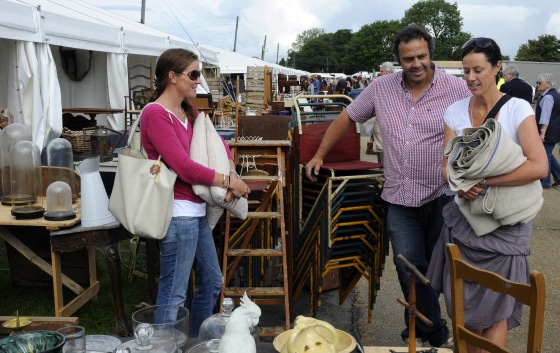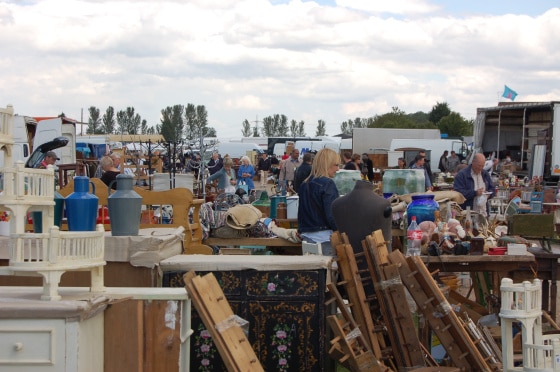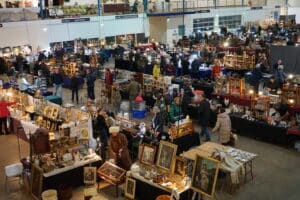
Antiques Dealing – “I lost my job.” is sadly something I hear with increasing frequency when I visit an antiques fair where anyone can turn up and sell. Of course, as one immediately feels bad about their self-esteem, children, loans, bills and the mortgage. But I also worry a little. I worry that all their newly ‘chosen’ profession will do is create false hope, drain precious savings – and make the situation worse. I’m not being critical, I’m being cautious and careful, which is especially important in these poor economic times. When a professional schooled on daytime antiques shows, the beloved Antiques Roadshow and a shelf of books, begins to rely on dealing to replace their monthly salary, things can get scary.
Lots of full-time dealers I know also have a small regular income they can rely on, such as a pension or a regular part-time job. Or a partner or spouse with one, or both of those. That’s important when the sixth rain-sodden early morning trawl of a car boot sale or ‘feeder fair’ yields little new stock to make a profit on. Especially a profit that, after tax and the cost of the item, even approaches their previous monthly salary. And that’s before you’ve considered the costs of entry, a bacon sandwich and a couple of cups of coffee, and the fuel to drive there and back. Such questions usually raise a smile from the TV viewer, but now the tables will be turned and they’ll be the targets of gems like “I know you’ve got £80 on it, but can it be a tenner?”. And, if the price doesn’t drop, then the almost shocked response is “Well, it happens on TV…”. Stating the obvious, those shows aren’t real life and it’s difficult to say no if you have invited the film crew into your shop for marketing and promotional reasons, and a camera is pointing directly at you. Then just add a well known antiques personality with pleading eyes…
One of the root causes of this problem is easy – it’s a lack of respect and common sense. I’ve never understood why people are happy to pay an accountant or plumber for their expertise and experience, but they’re only grudgingly happy to pay an antiques dealer for the same. When you think about it, all have to study and work to build up knowledge and experience. They also have to pay to promote themselves – be it in the Yellow Pages, online, or at a fair or in a shop. All also have living expenses, like mortgages, a car and gas bills. The only difference is that the dealer in antiques or collectables has to risk their own money (tens of thousands of pounds, or more) by paying for the stock they are selling. And it might not sell for the sum they hoped, if it sells at all. Auction houses don’t do this, as they act purely as agent in the transaction. And with many auction houses now taking around 35% of the ‘value’ of a piece in combined vendor’s commission, buyer’s premium and other fees, the often reviled dealer’s markup isn’t looking expensive at all. “Never begrudge a man his profit.”, the saying goes. Somehow, perhaps due to the massive drops in price shown on daytime TV, the dealer has been portrayed as a money grabbing conman using their knowledge to make, errr, a profit.
And, speaking of profit, just think of high street retailers. Have you ever wondered how much money they’re making in the sales on massively reduced sale prices? Quite a lot actually – they have rents to cover, staff to pay, and dividends to shareholders to pay. Which makes you wander quite how much they’re making at full price, if they can still make money on a discount of 50% or more. By comparison, the actual cost of a good antique or collectable is often way more than 50% of the retail price. If this sounds like a warning to anyone newly redundant and thinking of entering the trade, let me add another often unthought of facet. Such newbies are often a great boon to more established experts, collectors and dealers. I visited a large indoor fair recently and met a truly lovely couple who had a few pieces of glass, carefully amassed from car boot sales and provincial auction rooms around Britain. Nestled in amongst them was an eye-wateringly scarce piece that was incorrectly identified and completely under-valued. Of course, I bought it immediately for my collection and, if I ever sell it, I’ll make a handsome profit. I’m sure I’ve undersold things, and will continue to do so, but bear in mind that we’re all part of one long ‘food chain’. Where you are on it depends on your funding, staying power, experience, expertise – and luck.
Of course, I realize that this sounds all very ‘doom and gloom’. The new blood entering the fray of dealing in antiques will undoubtedly yield some great dealers of the future. But the battle to get there will certainly cause casualties. The very nature of the beautiful items that make up antiques and collectables, the ingrained ‘myth’ of the ease of antiques dealing, and the great many TV series that have been broadcast since the 1970s all make what is a very difficult profession look easy. Quoting my father, “If it was that easy, everyone would be doing it.” Yes, I find that highly irritating too. At a recent fair, I bumped into Karen, one of the contributors from ‘Cracking Antiques’, the series I filmed for BBC2 back in 2010. At the time, Karen had an office job she hated and she felt her life needed a change in direction. So, inspired by her new antiques-filled room, she bravely resigned to deal in shabby chic furniture and accessories from her local antiques centre. She now deals from fairs and has her own shop in Herefordshire. Always a sparky and positive character, she was full of life and had an infectious twinkle in her eye when I saw her again. She looked glowing. “I’m just so happy.”, she said. “We’ve never been poorer, but we’ve never been so rich in other ways.”
I guess what I’m saying is choose antiques dealing, rather than be forced into it. Or, indeed, seeing it as second best as indicated by “I lost my job and I love antiques, so I thought I’d give it ago.” Neither are enough for success, or for you.
P.S.;
Next time you visit Ardingly, Newark or somewhere and think of making a low, uninvited offer like they do on the telly, please, just don’t. Just think what went in to getting it to you.








